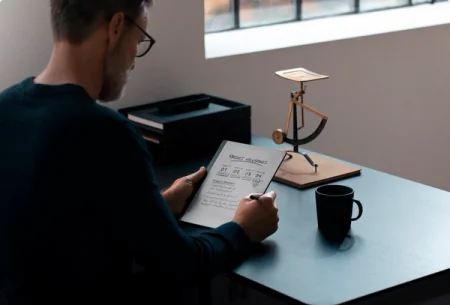Why handwriting is good for your memory
It’s impossible to deny that we live in a digital world. But with all the scrolling, tapping, and swiping, have we forgotten the benefits of the faithful pen and paper? A number of recent studies indicate that we have.

Thankfully, you don’t need to choose between digital devices and paper. With a reMarkable paper tablet, you get the best of both worlds: paper with digital powers.
In this piece, we’ll explain why handwriting is so important when it comes to spelling, memory, and understanding — and how you can take your writing and creativity further with a paper tablet.

Typing is less stimulating for your brain
While it’s true that typing is faster than writing by hand for most people, it has its downsides. In a study published in January 2024, researchers from the Developmental Neuroscience Laboratory at the Norwegian University of Science and Technology collected some compelling results.
Researchers recorded the brain activity of 36 university students when writing words in cursive using a digital pen on a touchscreen, or typing the same words using a keyboard. When comparing the results, they found that “handwriting activates almost the whole brain as compared to typewriting, which hardly activates the brain as such.”
“Handwriting activates almost the whole brain”

Handwriting makes your brain work harder
In the study, researchers learned that writing by hand required communication between the brain’s visual, sensory, and motor cortices. This means students had to visualize letters, then use their fine motor skills to control their movement when writing.
In contrast, pressing keys on a keyboard didn’t challenge the participants’ brains, so their brains didn’t need to communicate between different areas. This resulted in far less mental stimulation.

Handwriting improves spelling accuracy, memory, and recall
In another study, researchers unpacked why handwriting has such a dramatic effect on learning. Making complex hand movements while carefully shaping each letter with a pen “causes different underlying neurological processes that provide the brain with optimal conditions for learning and remembering”.
This fact holds true regardless of whether you’re using a traditional pen or pencil, or a digital pen. Meaning that switching to a digital writing device like reMarkable can be just as effective at boosting your spelling accuracy, memory, and recall as using traditional pen and paper.

It’s likely that we learn better when reading on paper
As paper continues to get left in the dust, many people have wondered whether switching to screen-based reading will have a detrimental effect on learning. And finally, we have an answer.
Another recent study from neuroscientists at Columbia University’s Teachers College shows that, for deeper reading, there’s a clear advantage to reading on paper, instead of a screen, where “shallow reading was observed”.
“There’s a clear advantage to reading on paper”

All the benefits of paper — with digital powers
While a reMarkable paper tablet isn’t actually made of paper, it still gives the same benefits. The textured display feels just like paper, and there’s almost no lag when writing with the Marker.
This results in the same paper feel you know and love, along with all the cognitive benefits and boosted recall that come from taking notes, plus reading on paper.
But that’s where the comparison ends, because a paper tablet offers a host of features that take the paper experience to new levels:
- It automatically converts your handwriting to typed text
- You can view, sync, and refine your work on the go with reMarkable’s mobile and desktop apps
- All your work is organized in one place, so there’s no more searching for missing documents or sticky notes on your desk
- There’s two weeks of battery life, so you can work for longer
Ready to take your handwriting to new heights? Learn more about reMarkable paper tablets here.


